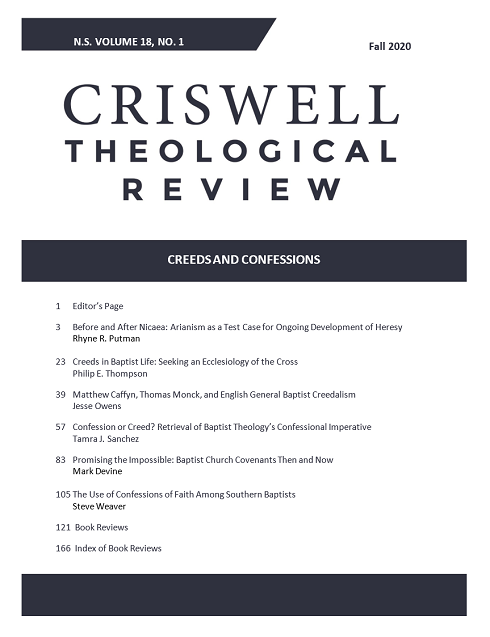Creeds and confessions of faith describe an assortment of doctrinal claims that Christian traditions affirm, and usually two major questions emerge when discussing their usage. One is whether they are functionally different from each other, and if so, how? This concern is often raised because, in many cases, creeds and confessions preserve common theological loci that all believers within various denominations share (i.e., creation, the Trinity, the deity of Christ). Yet sometimes confessions can be more specific than creeds in that they highlight differing interpretations of certain subjects like justification, the sacraments, or the return of Christ. Relatedly, another question pertains to the level of authority that creeds and confessions retain for believers. Should they be viewed as having equal authority with Scripture or not? Articulating an answer here can be complex because if one says "yes", then there are concerns about the fallibility of human interpretation(s). But if one says "no", then there is the danger of fostering irresponsible readings of biblical texts because there are no confessional boundaries to hold readers hermeneutically accountable. Consequently, because these questions are so important, our Fall 2020 edition of CTR is devoted to the role of creeds and confessions in the life of the church.
Our lead article is written by Rhyne R. Putman who is Associate Vice President for Academic Affairs, Director of Worldview Formation, and Professor of Christian Ministries at Williams Baptist University in Walnut Ridge, Arkansas. Putman explores a significant point in church history where a heterodox proposal served as the impetus for the development of precise creedal terminology that clarified orthodox beliefs. The subject of his inquiry is Nicene Christology (including the language of the Nicene Creed) and how it developed in response to the ideas promoted by the famous fourth-century presbyter, Arius.
Our second article is by Philip E. Thompson who is Professor of Systematic Theology and Christian Heritage at Sioux Falls Seminary in Sioux Falls, South Dakota. Thompson engages the renewed interest among many scholars regarding the roles of confessions and creeds in Baptist life. He argues that one feature of this conversation needing more attention is the idea that confessions help form a kind of theological narrative that gives identity to the church and subverts all counter-narratives offered by the world, which are driven by power and selfish ambitions.
The third article is written by Jesse Owens who is an Adjunct Professor at Welch College in Gallatin, Tennessee. Owens provides a survey of a Christological controversy among English General Baptists in the seventeenth and early eighteenth-centuries. The ordeal was fueled by the non-Chalcedonian views of Matthew Caffyn, which were confronted by General Baptist leaders including Thomas Monck. Owens discusses how Caffyn's views were repudiated largely through appeals to relevant biblical data as well as creeds and confessions that affirmed the two natures of Christ.
Our fourth contributor is Tamra J. Sanchez who currently is an independent scholar in Fort Worth, TX. Sanchez addresses the question of whether there are functional differences between creeds and confessions. She concludes that there are and contends that the differences are advantageous for Baptists who historically have expressed reluctance toward all forms of creedalism. As a viable alternative, Sanchez believes Baptists can hold to some set of confessional parameters while viewing Scripture as the supreme doctrinal norm.
The fifth contributor is Mark DeVine who is Associate Professor of Divinity at Beeson Divinity School at Samford University in Birmingham, Alabama. DeVine discusses how church covenants helped foster communal solidarity and moral accountability among church members in the early centuries of Baptist history. He then surveys the current surge among churches that are promoting their use and concludes by highlighting some the benefits that such trends can have for Baptists today.
Our last entry is by Steve Weaver who is the pastor of Farmdale Baptist Church in Frankfort, Kentucky. Weaver explores some of the key figures, ideas, and confessions that contributed to the rich history of confessions of faith among Southern Baptists.
Following these articles are twenty-one book reviews that inform readers about works which can improve their theological libraries. Also remember that past issues of CTR are accessible at atla.com. Your local university or seminary can provide you with a password.
Tuesday, February 23, 2021
Criswell Theological Review 18/1
Subscribe to:
Post Comments (Atom)

No comments:
Post a Comment